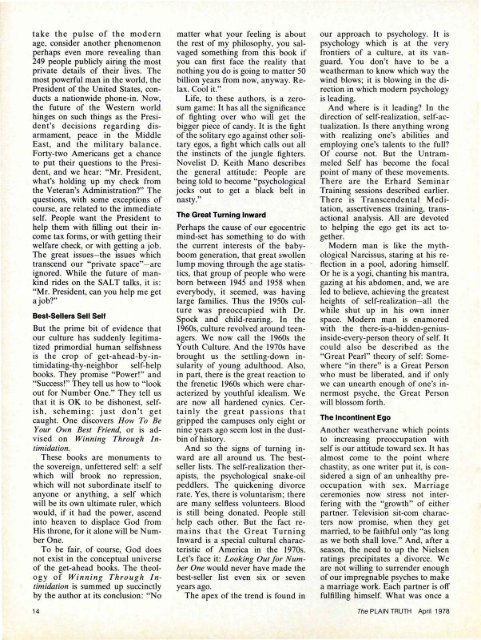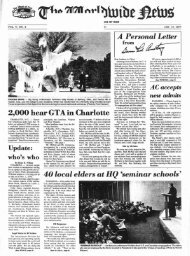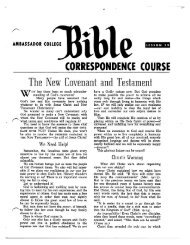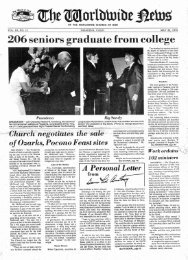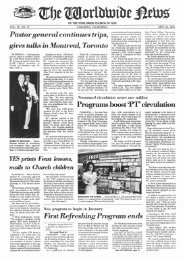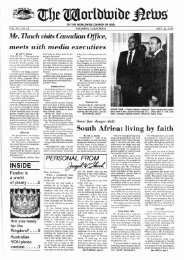Plain Truth 1978 (Prelim No 04) Apr - Herbert W. Armstrong
Plain Truth 1978 (Prelim No 04) Apr - Herbert W. Armstrong
Plain Truth 1978 (Prelim No 04) Apr - Herbert W. Armstrong
Create successful ePaper yourself
Turn your PDF publications into a flip-book with our unique Google optimized e-Paper software.
t ak e th e pulse of th e modern<br />
age, consider another phenomenon<br />
perhaps even more revealin g than<br />
249 people publicly airing the most<br />
private details of the ir lives. Th e<br />
most powerful man in the world, the<br />
President of the United States, conducts<br />
a nationwide phone-in. <strong>No</strong>w,<br />
the future of the Western world<br />
hinges on such things as the President's<br />
decision s regarding di sarma<br />
ment, peace in the Middle<br />
Eas t, and th e military bal ance.<br />
Forty-two Americans get a chance<br />
to put their questions to the President<br />
, and we hear: "Mr. President,<br />
what's holdin g up my check from<br />
the Veteran's Administration?" The<br />
que stions, with some excepti ons of<br />
course, are related to the immediate<br />
self. People want the President to<br />
help them with filling out their income<br />
tax forms, or with getting their<br />
welfare check, or with getting a job .<br />
The great issues- the issues which<br />
transcend our "private space"-are<br />
ignored. While the future of mankind<br />
rides on the SALT talks, it is:<br />
"Mr. President, can you help me get<br />
a job?"<br />
Best-Sellers Sell Self<br />
But the prime bit of evidence that<br />
our culture has suddenly legitimatized<br />
prim ordial human selfishness<br />
is the cro p of ge t-a head-by-intimid<br />
at ing-thy-neighbor self-help<br />
books. They promise " Power!" and<br />
"Success!" They tell us how to " look<br />
out for Number One." They tell us<br />
that it is OK to be dishonest, selfish,<br />
schem ing: just don't g et<br />
caught. One discovers How To Be<br />
Your Own Best Friend, or is advised<br />
on Winning Through Intimidation.<br />
These books are monument s to<br />
the sovereign, unfettered self: a self<br />
which will brook no repressio n,<br />
which will not subordinate itself to<br />
anyone or anything, a self which<br />
will be its own ultim ate ruler, which<br />
would , if it had the power, ascend<br />
into heaven to displa ce God from<br />
His thron e, for it alone will be Number<br />
One.<br />
To be fair, of course, God does<br />
not exist in the conceptual universe<br />
of the get-ahead books. The theo logy<br />
of W inning Through Intimidation<br />
is summed up succinctly<br />
by the author at its conclusion: "<strong>No</strong><br />
14<br />
matter what your feeling is about<br />
the rest of my philosophy, you salvaged<br />
something from this book if<br />
you can first face the rea lity that<br />
nothing you do is going to matt er 50<br />
billion years from now, anyway . Relax.<br />
Cool it."<br />
Life, to these authors, is a zerosum<br />
game : It has all the significance<br />
of fight ing over who will get the<br />
bigger piece of candy. It is the fight<br />
of the solitary ego against other solitary<br />
egos, a fight which calls out all<br />
the instincts of the jungle light ers.<br />
<strong>No</strong>ve list D. Keith Mano describes<br />
the general attitude: People are<br />
being told to become "psychologica l<br />
joc ks out to get a black belt in<br />
nasty."<br />
The Great Turning Inward<br />
Perh aps the cause of our egocentric<br />
mind -set has something to do with<br />
the current interests of the babyboom<br />
generation, that grea t swollen<br />
lump moving through the age sta tistics,<br />
that group of people who were<br />
born between 1945 and 1958 when<br />
everybody, it seemed, was having<br />
large families. Thus the 1950s culture<br />
was preoccupied with Dr.<br />
Spock and child-rearing. In the<br />
I960s, culture revolved around teenagers.<br />
We now call the 1960s the<br />
You th Culture. And the 1970s have<br />
brou ght us the settling-down insularity<br />
of young adulthood. Also,<br />
in part , there is the grea t react ion to<br />
the frenetic 1960s which were cha racterized<br />
by youthful idealism. We<br />
are now all hard ened cynics. Certainly<br />
th e great passi on s th at<br />
gripped the campuses only eight or<br />
nine years ago seem lost in the du stbin<br />
of history.<br />
And so the signs of turning inward<br />
are all aro und us. The bestseller<br />
lists. The self-realization therapists,<br />
the psychological snake-oil<br />
peddlers. Th e qu ickening divorce<br />
rat e. Yes, there is voluntarism; there<br />
are many selfless volunteers. Blood<br />
is still being donated. People still<br />
. help each other. But the fact rema<br />
in s th at th e Great Turning<br />
Inward is a special cultural cha racteristic<br />
of Amer ica in the 1970s.<br />
Let's face it: Looking Out fo r N umber<br />
One would never have mad e the<br />
best-seller list even six or seven<br />
years ago.<br />
The apex of the trend is found in<br />
our approach to psychology. It is<br />
psychology which is at the very<br />
frontiers of a culture, at its van <br />
gua rd. You don't have to be a<br />
weatherma n to know which way the<br />
wind blows; it is blowing in the direction<br />
in which modern psychology<br />
is leading.<br />
And where is it leading? In the<br />
direction of self-realization, self-actualization.<br />
Is there anything wrong<br />
with realizing one's abilities and<br />
employing one's talents to the full?<br />
Of course not. But the Un trammeled<br />
Self has become the focal<br />
point of many of these movements.<br />
The re are th e Erh ard Seminar<br />
Training sessions described earlier.<br />
There is Tran scendental Meditation,<br />
assertiveness training, transactional<br />
analysis. All are devoted<br />
to helpin g the ego get its act together.<br />
Modern man is like the mythological<br />
Narcissus, staring at his reflection<br />
in a pool, adoring himself.<br />
Or he is a yogi, chanting his mantra,<br />
gazing at his abdomen, and, we are<br />
led to believe, achieving the grea test<br />
heights of self-realization-all the<br />
while shut up in his own inner<br />
space . Modern man is enamored<br />
with the there-is-a-hidden-geniusinside-every-person<br />
the ory of self. It<br />
co uld also be descr ibed as th e<br />
"G rea t Pearl" theory of self: Somewhere<br />
"in there" is a Great Person<br />
who must be liberated, and if only<br />
we can unearth enough of one's innerm<br />
ost psyche, the Great Person<br />
will blossom forth .<br />
The Incontinent Ego<br />
Another weathervane which points<br />
to increasing preoccup at ion with<br />
self is our attitude toward sex. It has<br />
almost come to the point where<br />
chastity, as one writer put it, is considered<br />
a sign of an unh ealth y preocc<br />
upa tion with sex . Marriage<br />
ceremonies now stress not interfering<br />
with the "gro wth" of either<br />
partner. Television sit-com characters<br />
now promise, when they get<br />
mar ried, to be faithful only "as long<br />
as we both shall love." And, afte r a<br />
seaso n, the need to up the Nielsen<br />
ratings precipitates a divorce. We<br />
are not willing to surrender eno ugh<br />
of our impregnable psyches to make<br />
a marriage work. Each partner is off<br />
fulfilling himself. What was once a<br />
The PLAIN TRUTH <strong>Apr</strong>il <strong>1978</strong>


